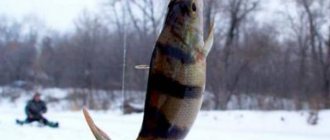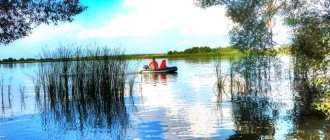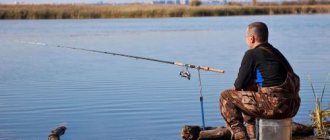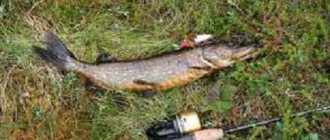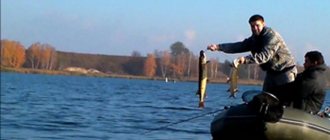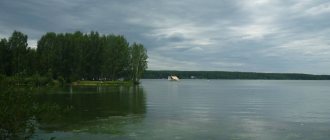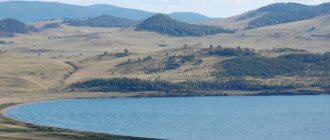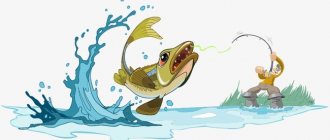How did you fish in Komi before?
The main rivers of the Komi region were connected to lakes using a channel or kurya. It was customary to place passive fishing gear there: muzzles, venteri and nets. A team of fellow villagers made barriers across the reservoir to catch salmon and nelma, which were moving along the river to spawn. On small rivers and canals, locks were used.
Homemade muzzles—wooden fishing implements—were widespread. They put double muzzles on Sysol. Of the nets, the most common were vetels - fixed fishing nets on hoops. They caught salmon, bream and other types of fish.
Archaeological excavations have shown that the Komi had seines - net fishing tools - back in the Mesolithic era. Every family had at least one small net. To catch fish on large rivers, they made one large seine from several small ones. On Pechora, the seine could be almost a kilometer in size.
They caught it with a seine in winter, lowering it under the ice hole and dragging it with a stick to the next hole. On the shore there was usually the widest and most important hole, where the seine with the catch was pulled out. Pechora herring, nelma, salmon, and omul were caught in this way. Roaches were caught using fixed nets, mainly during the May flood.
They also fished from boats, floating a seine along the river. Fishing with fishing rods produced a small catch, so it was considered unproductive. Mostly children fished with fishing rods. Adults preferred fishing with longitudinal hooks, which were strings about thirty meters long, to which strong hooks were tied on small leashes.
And in quiet rivers and oxbow lakes they fished. Fishing could have been an auxiliary activity for Komi hunters. When this fishing became boring during the commercial hunting season, the hunters took up fishing, especially since the forest and the river were nearby. In their fishing grounds, hunters especially loved to fish on spears.
After the rivers and lakes were covered with ice, the killing of fish under the ice began. At night, we walked around with torches and looked for fish under the ice. The ice was still thin and transparent then. If they saw a fish, they hit the ice hard with the butt of an ax, the fish got scared and became stunned by the sound and impact.
Thin ice was easily broken off, and the stunned fish were pulled out from under the ice. The Pechora Komi preferred artel fishing using seines. The artel usually had one large seine for everyone. The caught fish was divided equally among all members of the artel.
Rivers and lakes were not personal property. If the place was not occupied, anyone could sit down and fish, set nets or longitudinal lines, but only so as not to disturb other fishermen. Fish was salted for sale and dried for personal use.
Fishing in Komi
Dried fish, like dried meat, as mentioned above, was also intended for filling pies, for soups, and was taken with you on the road or for haymaking. Large and valuable fish were dried in the sun. They knew how to make glue from fish scales, and fish oil served to illuminate the room.
Thus, we can say that for the Komi people, hunting and fishing used to play an important role in their lives, especially for the male part of the population. Fish and meat made the peasant's meager table more varied.
With the proceeds from the sale of game, one could buy things for the home. But at the same time, the Zyryans lived in harmony with nature: they did not spoil in the forest or on the pond, and did not play tricks on other hunters and fishermen. They treated Mother Nature with love and respect, and the Komi taiga was affectionately called Parma.
Bite forecast
White amur
0
There is no bite for grass carp. Grass carp are found in deep places.
0
There is no bite for grass carp. Grass carp are found in deep places.
0
There is no bite for grass carp. Grass carp are found in deep places.
0
There is no bite for grass carp. Grass carp are found in deep places.
0
There is no bite for grass carp. Grass carp are found in deep places.
0
There is no bite for grass carp. Grass carp are found in deep places.
0
There is no bite for grass carp. Grass carp are found in deep places.
0
There is no bite for grass carp. Grass carp are found in deep places.
0
There is no bite for grass carp. Grass carp are found in deep places.
0
There is no bite for grass carp. Grass carp are found in deep places.
0
There is no bite for grass carp. Grass carp are found in deep places.
0
There is no bite for grass carp. Grass carp are found in deep places.
0
There is no bite for grass carp. Grass carp are found in deep places.
0
There is no bite for grass carp. Grass carp are found in deep places.
0
There is no bite for grass carp. Grass carp are found in deep places.
0
There is no bite for grass carp. Grass carp are found in deep places.
Minnow
36
Sluggish minnow bite The minnow is found in deep places
46
The minnow bite is worse than average. The minnow is found in deep places.
43
The minnow bite is worse than average. The minnow is found in deep places.
29
There is almost no minnow bite. The minnow is located at shallow depths.
20
No minnow biting Minnow is found in deep places
28
There is almost no minnow bite. The minnow is found in deep places.
47
The minnow bite is worse than average. The minnow is found in deep places.
73
Good minnow bite The minnow is located at shallow depths
42
The minnow bite is worse than average. The minnow is found in deep places.
72
Good minnow bite The minnow is located at shallow depths
78
Good minnow bite Minnow is found in deep places
72
Good minnow bite The minnow is located at shallow depths
39
Sluggish minnow bite The minnow is found in deep places
56
Average minnow bite The minnow is found in deep places
73
Good minnow bite Minnow is found in deep places
73
Good minnow bite The minnow is located at shallow depths
Dace
64
Good bite for dace Dace is located at shallow depths
58
Average bite for dace Dace is located at shallow depths
45
The dace bite is worse than average. The dace is located at shallow depths.
32
Sluggish bite of dace Dace is located at shallow depths
33
Sluggish bite of dace Dace is located at shallow depths
33
Sluggish bite of dace Dace is located at shallow depths
46
The dace bite is worse than average. The dace is located at shallow depths.
66
Good bite for dace Dace is located at shallow depths
70
Good bite for dace Dace is located at shallow depths
64
Good bite for dace Dace is located at shallow depths
77
Good bite for dace Dace is located at shallow depths
77
Good bite for dace Dace is located at shallow depths
65
Good bite for dace Dace is located at shallow depths
58
Average bite for dace Dace is found in deep places
65
Good bite for dace. Dace is found in deep places.
65
Good bite for dace. Dace is found in deep places.
crucian carp
24
There is almost no bite for crucian carp. Crucian carp is found in deep places.
27
There is almost no bite for crucian carp. Crucian carp is found in deep places.
24
There is almost no bite for crucian carp. Crucian carp is found in deep places.
24
There is almost no bite for crucian carp. Crucian carp is located at shallow depths
12
There is no bite for crucian carp. Crucian carp is in deep places.
15
There is no bite for crucian carp. Crucian carp is in deep places.
23
There is almost no bite for crucian carp. Crucian carp is found in deep places.
49
The bite of crucian carp is worse than average. Crucian carp is located at shallow depths
25
There is almost no bite for crucian carp. Crucian carp is found in deep places.
22
There is almost no bite for crucian carp. Crucian carp is found in deep places.
33
Sluggish bite of crucian carp Crucian carp is found in deep places
47
The bite of crucian carp is worse than average. Crucian carp is located at shallow depths
20
There is no bite for crucian carp. Crucian carp is in deep places.
25
There is almost no bite for crucian carp. Crucian carp is found in deep places.
36
Sluggish bite of crucian carp Crucian carp is found in deep places
44
The bite of crucian carp is worse than average. Crucian carp is located at shallow depths
Carp
21
There is almost no carp bite. The carp is located at shallow depths
0
No carp biting Carp are in deep places
0
No carp biting Carp are in deep places
8
No carp biting Carp is located at shallow depths
0
No carp biting Carp are in deep places
0
No carp biting Carp are in deep places
0
No carp biting Carp are in deep places
0
No carp biting Carp are in deep places
0
No carp biting Carp are in deep places
0
No carp biting Carp are in deep places
0
No carp biting Carp are in deep places
0
No carp biting Carp are in deep places
0
No carp biting Carp are in deep places
0
No carp biting Carp are in deep places
0
No carp biting Carp are in deep places
0
No carp biting Carp are in deep places
Bream
45
Bream bite is worse than average Bream is found in deep places
46
Bream bite is worse than average Bream is found in deep places
36
Sluggish bream bite Bream is found in deep places
28
There is almost no bream bite Bream is found in deep places
25
There is almost no bream bite Bream is found in deep places
28
There is almost no bream bite Bream is found in deep places
39
Sluggish bream bite Bream is found in deep places
62
Good bite for bream Bream is found in deep places
53
Average bream bite Bream is found in deep places
56
Average bream bite Bream is found in deep places
68
Good bite for bream Bream is found in deep places
75
Good bream bite Bream is found in deep places
51
Average bream bite Bream is found in deep places
58
Average bream bite Bream is found in deep places
61
Good bite for bream Bream is found in deep places
68
Good bite for bream Bream is found in deep places
Mikizha (rainbow trout)
59
Average bite of mykiss (rainbow trout) Mykiss (rainbow trout) is located at shallow depths
53
Average bite of mykiss (rainbow trout) Mykiss (rainbow trout) is located at shallow depths
41
Mykizha (rainbow trout) bite is worse than average Mykizha (rainbow trout) is located at shallow depths
29
There is almost no bite of mykiss (rainbow trout) Mykiss (rainbow trout) is located at shallow depths
30
There is almost no bite of mykiss (rainbow trout) Mykiss (rainbow trout) is located at shallow depths
30
There is almost no bite of mykiss (rainbow trout) Mykiss (rainbow trout) is located at shallow depths
43
Mykizha (rainbow trout) bite is worse than average Mykizha (rainbow trout) is located at shallow depths
61
A good bite of mykiss (rainbow trout) Mykiss (rainbow trout) is located at shallow depths
65
A good bite of mykiss (rainbow trout) Mykiss (rainbow trout) is located at shallow depths
60
Average bite of mykiss (rainbow trout) Mykiss (rainbow trout) is located at shallow depths
72
Good bite of mykiss (rainbow trout) Mykiss (rainbow trout) is located at shallow depths
72
Good bite of mykiss (rainbow trout) Mykiss (rainbow trout) is located at shallow depths
61
A good bite of mykiss (rainbow trout) Mykiss (rainbow trout) is located at shallow depths
56
Average bite of mykiss (rainbow trout) Mykiss (rainbow trout) is found in deep places
61
A good bite of mykiss (rainbow trout) Mykiss (rainbow trout) is found in deep places
61
A good bite of mykiss (rainbow trout) Mykiss (rainbow trout) is found in deep places
Burbot
81
Very good bite for burbot. Burbot is found in deep places.
66
Good bite for burbot. Burbot is found in deep places.
46
The burbot bite is worse than average. Burbot is found in deep places
41
The burbot bite is worse than average. Burbot is found in deep places
45
The burbot bite is worse than average. Burbot is found in deep places
40
Sluggish bite of burbot Burbot is found in deep places
50
The burbot bite is worse than average. Burbot is found in deep places
90
Very good bite for burbot. Burbot is found in deep places.
96
Excellent bite for burbot Burbot is located at shallow depths
93
Excellent bite for burbot. Burbot is found in deep places.
99
Excellent bite for burbot. Burbot is found in deep places.
100
The best bite for burbot Burbot is found in deep places
100
The best bite for burbot Burbot is found in deep places
95
Excellent bite for burbot. Burbot is found in deep places.
78
Good bite for burbot Burbot is found in deep places
98
Excellent bite for burbot. Burbot is found in deep places.
Perch
0
No perch biting Perch is in deep places
51
Average perch bite Perch is found in deep places
40
Sluggish perch bite Perch is in deep places
21
There is almost no perch bite. The perch is in deep places
0
No perch biting Perch is in deep places
22
There is almost no perch bite. The perch is in deep places
38
Sluggish perch bite Perch is in deep places
50
The perch bite is worse than average. The perch is in deep places.
0
No perch biting Perch is in deep places
56
Average perch bite Perch is found in deep places
56
Average perch bite Perch is found in deep places
51
Average perch bite Perch is found in deep places
0
No perch biting Perch is in deep places
57
Average perch bite Perch is found in deep places
60
Average perch bite Perch is found in deep places
54
Average perch bite Perch is found in deep places
Gudgeon
42
The gudgeon bite is worse than average. The gudgeon is found in deep places.
47
The gudgeon bite is worse than average. The gudgeon is found in deep places.
40
Sluggish gudgeon bite The gudgeon is found in deep places
30
There is almost no gudgeon bite. The gudgeon is located at shallow depths
23
There is almost no gudgeon bite. The gudgeon is found in deep places
29
There is almost no gudgeon bite. The gudgeon is found in deep places
44
The gudgeon bite is worse than average. The gudgeon is found in deep places.
62
A good bite for minnows. Minnows are located at shallow depths.
49
The gudgeon bite is worse than average. The gudgeon is found in deep places.
56
The average bite of a gudgeon. The gudgeon is found in deep places.
73
Good bite for minnows. Minnows are found in deep places.
73
Good gudgeon bite The gudgeon is located at shallow depths
46
The gudgeon bite is worse than average. The gudgeon is found in deep places.
57
The average bite of a gudgeon. The gudgeon is found in deep places.
69
A good bite for minnows. Minnows are found in deep places.
63
A good bite for minnows. Minnows are found in deep places.
Roach
40
Sluggish biting of roaches Roaches are found in deep places
52
Average roach bite Roach is found in deep places
40
Sluggish biting of roaches Roaches are found in deep places
29
There is almost no roach biting Roach is found in deep places
23
There is almost no roach biting Roach is located at shallow depths
32
Sluggish biting of roaches Roaches are found in deep places
44
Roach bite is worse than average Roach is found in deep places
63
Good roach bite Roach is found in deep places
49
The roach bite is worse than average The roach is located at shallow depths
64
Good roach bite Roach is found in deep places
77
Good roach bite Roach is found in deep places
77
Good roach bite Roach is found in deep places
46
Roach bite is worse than average Roach is found in deep places
65
Good roach bite Roach is found in deep places
69
Good roach bite Roach is found in deep places
69
Good roach bite Roach is found in deep places
Rotan
48
Rotan bite is worse than average Rotan is found in deep places
38
Sluggish bite of rotan rotan is found in deep places
30
There is almost no bite for rotan. Rotan is found in deep places.
17
There is no bite for rotan. Rotan is found in deep places.
18
There is no bite for rotan. Rotan is found in deep places.
18
There is no bite for rotan. Rotan is found in deep places.
32
Sluggish bite of rotan rotan is found in deep places
45
Rotan bite is worse than average Rotan is found in deep places
48
Rotan bite is worse than average Rotan is found in deep places
48
Rotan bite is worse than average Rotan is found in deep places
43
Rotan bite is worse than average Rotan is found in deep places
43
Rotan bite is worse than average Rotan is found in deep places
44
Rotan bite is worse than average Rotan is found in deep places
44
Rotan bite is worse than average Rotan is found in deep places
49
Rotan bite is worse than average Rotan is found in deep places
49
Rotan bite is worse than average Rotan is found in deep places
Grayling
22
There is almost no grayling bite Grayling is located at shallow depths
65
Good bite for grayling Grayling is located at shallow depths
51
Average grayling bite Grayling is located at shallow depths
36
Sluggish bite of grayling Grayling is located at shallow depths
12
No grayling bite Grayling is located at shallow depths
38
Sluggish bite of grayling Grayling is located at shallow depths
54
Average grayling bite Grayling is located at shallow depths
77
Good grayling bite Grayling is located at shallow depths
25
There is almost no grayling bite Grayling is located at shallow depths
78
Good grayling bite Grayling is located at shallow depths
94
Excellent bite of grayling Grayling is located at shallow depths
94
Excellent bite of grayling Grayling is located at shallow depths
24
There is almost no grayling bite Grayling is located at shallow depths
77
Good grayling bite Grayling is found in deep places
80
Good grayling bite Grayling is found in deep places
80
Good grayling bite Grayling is found in deep places
Pike
0
No pike biting Pike are in deep places
60
Average pike bite Pike are found in deep places
40
Sluggish pike bite Pike is located at shallow depths
23
There is almost no pike bite Pike are located at shallow depths
0
No pike biting Pike are in deep places
26
There is almost no pike biting Pike are in deep places
44
Pike bite is worse than average Pike is located at shallow depths
62
Good pike bite Pike is located at shallow depths
0
No pike biting Pike are in deep places
64
Good pike bite Pike are found in deep places
52
Average pike bite Pike is located at shallow depths
52
Average pike bite Pike is located at shallow depths
0
No pike biting Pike are in deep places
66
Good pike bite Pike are found in deep places
64
Good pike bite Pike is located at shallow depths
64
Good pike bite Pike is located at shallow depths
Ide
46
The ide bite is worse than average. The ide is located at shallow depths.
59
Average bite of ide. Ide is located at shallow depths.
46
The ide bite is worse than average. The ide is located at shallow depths.
33
Sluggish bite of ide Ide is located at shallow depths
24
There is almost no ide bite. The ide is located at shallow depths
34
Sluggish bite of ide Ide is located at shallow depths
47
The ide bite is worse than average. The ide is located at shallow depths.
67
Good bite for ide. Ide is located at shallow depths.
50
The ide bite is worse than average. The ide is located at shallow depths.
66
Good bite for ide. Ide is located at shallow depths.
79
Good bite for ide. Ide is located at shallow depths.
79
Good bite for ide. Ide is located at shallow depths.
47
The ide bite is worse than average. The ide is located at shallow depths.
60
Average bite of ide. Ide is located at shallow depths.
67
Good bite for ide. Ide is located at shallow depths.
67
Good bite for ide. Ide is located at shallow depths.
Ruff
69
Good bite for ruff The ruff is located at a shallow depth
51
The average bite of the ruff Ruff is in deep places
40
Sluggish bite of the ruff Ruff is found in deep places
25
There is almost no bite for the ruff. The ruff is located at a shallow depth
23
There is almost no bite for the ruff. The ruff is located at a shallow depth
22
There are almost no ruff bites. The ruff is found in deep places
38
Sluggish bite of the ruff Ruff is found in deep places
57
The average bite of the ruffe The ruff is located at a shallow depth
61
Good bite for ruff The ruff is located at a shallow depth
58
The average bite of the ruffe The ruff is located at a shallow depth
55
The average bite of the ruff Ruff is in deep places
58
The average bite of the ruffe The ruff is located at a shallow depth
60
The average bite of the ruffe The ruff is located at a shallow depth
57
The average bite of the ruff Ruff is in deep places
60
The average bite of the ruff Ruff is in deep places
60
The average bite of the ruff Ruff is in deep places
Add:
Modern fishing in the Komi Republic
There are many rivers and lakes in Komi. The largest river is the Pechora River. This is a long, deep river with many tributaries, the largest in the European North. The length of the river is more than 1,800 kilometers, approximately eighty rivers flow into it, and there are more than sixty thousand lakes in its basin.
It flows throughout almost the entire territory of the republic and has many small and medium-sized tributaries even outside the region. This river is home to more than thirty species of fish, many of which are valuable. Sterlet, listed in the Red Book of Russia, lives here. Its fishing is prohibited at any time of the year.
In Pechora there is a lot of vendace, pink salmon, salmon, grayling, pike, nelma and other fish. There are also traditional freshwater inhabitants: pike, pike perch, roach, dace, perch. There are only small settlements on this river, so the ecology here is good. You can cook delicious fish soup from Pechora fish or fry it.
There are practically no fishing bases here, so fishermen prefer to get there on their own and stay fishing for a day or more. The roads leading here are bad, so you will need an SUV. In principle, you can get to any settlement located on Pechora, leave your car here and get to the river on foot or by bicycle.
You can take a lot of food, dishes and a tent with you and stay for a long fishing trip. The Komi people respect nature and the environment, so you should pick up trash after yourself and take it back. You can spend the night in huts, which are scattered in the taiga for hunting purposes.
Take a compass and waterproof clothing with you, because Komi has a capricious climate. Even in summer it can be cool here, with cold rains often pouring. From June to August, reservoirs are full of blood-sucking insects: mosquitoes, mosquitoes and midges, so you should stock up on repellents and take a mosquito net.
You should familiarize yourself with the fishing rules. On the Pechora and other rivers and lakes in the region, fishing is prohibited during the spawning period, and on some rivers, fishing is temporarily prohibited. The fishery inspectorate can reach the violator of the law on a motorboat or land vehicle and severely punish the violator, classifying him as a poacher.
It is not always possible to fish with a spinning rod, but you can fish with a float almost everywhere outside the spawning period. The main thing is not to have an abundance of fishing rods with many hooks. On the territory of Komi there is the Yugyd Va National Park and the Pechora-Ilychsky Nature Reserve; fishing there will not be possible due to the protected status of protected areas.
Pechora-Ilychsky Reserve
The capital of Komi is the city of Syktyvkar. This is a small city with a population of only about 250 thousand people. But there is a large enterprise here that produces paper and cardboard. Despite the improvement in the environmental situation in the forestry area, the situation there is still not ideal.
The Vychegda River does not freeze in some places even in severe winters. Therefore, it is better not to fish in the Syktyvkar area. If you find yourself in this city, it is better to get in the car and drive thirty kilometers south from Syktyvkar along the Syktyvkar-Kirov highway. There are two good ice fishing spots there.
It is enough to leave the car near the village of Morovo or the Lozym sanatorium, and after five minutes of walking you will already be on a reservoir where roach, perch, dace and bream are biting well from the ice. You definitely need to take feeding and at least three types of bait with you, since in the south of Komi the fish are capricious in winter, especially during the deep winter.
The entire territory of Komi can be conditionally divided into two large parts. In the north of the region there are good fishing grounds; there is a wide variety of fish species in the rivers and lakes. But in the south of the Komi rivers no longer have a rich ichthyofauna. Everything is connected with poaching.
On rivers such as the Vychegda, Mezen, Kyltymya and Sysola, they are actively fighting against those who illegally set nets both in summer and winter, but there are clearly not enough inspectors. Fishermen forget their nets, the fish in them rot, and ordinary fishermen then suffer due to a bad bite. It often happens that a spinner casts a spinning rod and the spinner is lost, caught in an illegally placed net.
Fishing rivers of the Komi - Go fishing!
Home > Fishing techniques > Fishing rivers of the Komi
So, if you love fishing and decide to travel across the expanses of the country, you should pay attention to the rivers of the vast expanses of the country. The wild beauty of these places leaves an impression, so you don’t want to leave them
The most beautiful rivers for fishing are found in the Komi Republic, although they are still not popular among the masses of fishermen. You should start your trip from Pechora. On this fairly wide river it is quite difficult to find a suitable place, so you should try.
However, having discovered it, you cannot regret it - a wonderful perch will delight any angler because, despite its small or medium size, they are found in huge quantities.
The next fish found is grayling, but it is extremely difficult to catch it, because it lives in very strange, inaccessible places. Finding pike in these places is almost impossible even for local residents, let alone visiting tourists.
The Vym River is also very difficult to find parking. However, if you go down to the confluence of the river and a large tributary there is an extremely catchy point with a large amount of catch.
Select perch and grayling are found here in large numbers, however, as expected, fishing for grayling is quite challenging.
If you go higher, you can stumble upon rapids, where the main prey is also grayling. Fishing is most effective within a few hours after sunrise. When the Vym moves into Elva, dace and pike are added to the prey options.
Read How to put live bait on a pike trap
Although the shores are impassable, fishing in these places is extremely exciting. Traveling further north, where the roads end, you can come across a large number of rivers and streams. There are plenty of beautiful ides here, however, due to the numerous fallen trees the fishing is quite extreme.
Each turn of the river here is unique, so finding a pike site is quite easy.
Fishing here will bring you a lot of catches. And finally, you can get to the Sysola River. There are quite a few places to fish for pike, and in the morning it offers minimal resistance.
It is worth using an inflatable boat with a motor as a means of transportation, because it allows you to move very quickly along the river.
Fishing in Komi by season
In Komi you can fish both in open water and from ice. Winters here are long and harsh. In winter, daytime air temperatures in the south of Komi average minus fifteen degrees, but in the north of the region there are often thirty-degree frosts.
It is almost impossible to predict what the northern summer will be like. Sometimes the whole summer is hot and dry, and another year there may be cold rains all summer. Autumn comes early here. Already in mid-August the first yellow leaves appear on the trees.
Therefore, you should always take warm, waterproof clothes and a thermos with hot tea when fishing. In winter, you need to wear warm EVA boots or felt boots with galoshes; in summer, high rubber boots are preferable. The winter fishing season here lasts from November to March.
At this time, rivers and lakes are covered with thick ice. It bites well on the first and last ice, but you have to be careful. Therefore, during the active winter fish bite, the reservoirs are always full of people. Fishermen usually sit in tents. They can be purchased at fishing stores and are available to suit every taste and budget.
Ice fishing in a tent in Komi
These shelters are especially relevant in February, when piercing winds blow and there are often blizzards and snowfall. The wilderness in Komi lasts from mid-December to mid-February. But experienced fishermen, even at this time, catch pike with girders and roach with a winter fishing rod with a nod. On the last ice, perch, dace and roach fish well.
All winter they put donks on burbot. They are left overnight and checked in the morning. Ruff or track are used as live bait. At the end of April in the south of Komi and at the end of May in the northern territories, ice drift begins. After the rivers open up, there is usually no bite at all for two weeks. Then spawning bans begin.
open water fishing season in Komi Depending on the reservoir, you can catch pike, perch, dace, whitefish, nelma and many other fish here. The largest castes of fishermen are perch fishermen and roach anglers.
Komi has beautiful nature, so even if there is no bite at all, fishermen still do not come home empty-handed. In addition to the good mood from communicating with the picturesque northern nature, they bring home mushrooms and berries collected in coastal forests. In the Komi Republic, the taiga is rich in the gifts of nature.
July is the worst month for open water fishing. Due to the hot weather, it bites poorly even at dawn. But in August the feeding of pike and perch begins. In the fall, donks are usually set for burbot.
It is customary to use lamprey larvae as bait, which are searched for in the coastal bottom mud using a fork with teeth bent at ninety degrees. Autumn fishing for pike can be successful, as the toothy ones fatten up before wintering.
When fishing in the Komi Republic you come across trophies such as trout and salmon
Fish biting forecast in Syktyvkar, Komi Republic
| Weather forecast and fish bite | Syktyvkar, from 09/26/2021 to 09/29/2021 | |||||||||||||
| VS | Mon | VT | SR | |||||||||||
| Times of Day | Morning | Day | Evening | Night | Morning | Day | Evening | Night | Morning | Day | Evening | Night | ||
| Cloudiness, precipitation | Small rain | Small rain | Mainly cloudy | Small rain | Mainly cloudy | Mainly cloudy | Partly cloudy | Partly cloudy | Partly cloudy | Mainly cloudy | Mainly cloudy | Small rain | ||
| Temperature °C | 8 | 8 | 7 | 5 | 4 | 4 | 8 | 2 | 0 | 5 | 8 | 5 | ||
| Pressure, mm. | 759 | 760 | 763 | 765 | 768 | 771 | 772 | 774 | 774 | 774 | 772 | 772 | ||
| Direction, | Wind southeast | Wind southeast | East wind | East wind | East wind | East wind | East wind | East wind | Wind northwest | West wind | Wind northwest | Wind northwest | ||
| wind speed | 3 m/s | 4 m/s | 3 m/s | 4 m/s | 4 m/s | 4 m/s | 3 m/s | 2 m/s | 1 m/s | 1 m/s | 3 m/s | 2 m/s | ||
| According to the forecast, they will bite on: oparish, mastyrka, worm, pearl barley crucian carp | 60% | 50% | 50% | 50% | 60% | 50% | 55% | 55% | 80% | 65% | 65% | 65% | ||
| According to the forecast, the fish will bite on: makha (cake), peas, corn, boilies Carp | 60% | 50% | 50% | 50% | 60% | 50% | 45% | 45% | 70% | 65% | 65% | 65% | ||
| According to the forecast, they will bite on: boilies, corn, potatoes, makukha, crayfish Carp | 55% | 45% | 35% | 35% | 55% | 45% | 40% | 40% | 75% | 60% | 50% | 50% | ||
| According to the forecast, the fish will bite on: live bait, spinners, wobblers, and silicone baits Pike | 85% | 60% | 65% | 15% | 85% | 60% | 50% | 0% | 85% | 75% | 80% | 30% | ||
| According to the forecast, the fish will bite on: worms, small baitfish, spoons, wobblers, silicone Perch | 70% | 50% | 55% | 0% | 70% | 50% | 65% | 0% | 95% | 65% | 70% | 0% | ||
| According to the forecast, they bite on: live bait, wobblers, silicone, foam rubber Zander | 70% | 40% | 55% | 55% | 70% | 40% | 65% | 65% | 95% | 55% | 70% | 70% | ||
| According to the forecast, they will bite on: maggot, fly, grasshopper, worm Dace | 55% | 50% | 65% | 30% | 55% | 50% | 75% | 40% | 80% | 65% | 80% | 45% | ||
| According to the forecast, they will bite on: maggot, worm Ruff | 55% | 45% | 45% | 30% | 55% | 45% | 55% | 40% | 80% | 60% | 60% | 45% | ||
| According to the forecast, the fish will bite on: worm, grasshopper, spinner, wobbler, silicone Trout | 60% | 50% | 55% | 25% | 60% | 50% | 65% | 35% | 90% | 70% | 75% | 45% | ||
| According to the forecast, the fish will bite on: spinners, wobblers, live bait, grasshoppers, frogs, crayfish Chub | 55% | 45% | 60% | 25% | 55% | 45% | 75% | 40% | 90% | 65% | 80% | 45% | ||
| According to the forecast, the fish will bite on: worm, mayfly, spinner, artificial fly Grayling | 55% | 30% | 45% | 0% | 55% | 30% | 55% | 0% | 85% | 50% | 65% | 0% | ||
| According to the forecast, the fish will bite on: spinners, wobblers, silicone, grasshoppers, streamers Asp | 55% | 30% | 45% | 0% | 55% | 30% | 55% | 5% | 85% | 50% | 65% | 15% | ||
| Bait: sponge, fly, bread, worm, small spoon Rudd | 55% | 35% | 40% | 0% | 55% | 35% | 50% | 0% | 85% | 55% | 60% | 0% | ||
| Bait: oparysh, peas, wheat, pearl barley, worm Bream | 55% | 25% | 55% | 45% | 55% | 25% | 65% | 55% | 85% | 45% | 75% | 65% | ||
| Bait: no Burbot | 0% | 0% | 0% | 0% | 0% | 0% | 0% | 0% | 0% | 0% | 0% | 0% | ||
| Bait: parish, dough, mastyrka, pearl barley, wheat Roach | 60% | 40% | 45% | 0% | 60% | 40% | 45% | 0% | 75% | 55% | 60% | 0% | ||
| Bait: oparysh, mastyrka, worm, corn, pearl barley Bleak | 65% | 55% | 60% | 0% | 65% | 55% | 75% | 0% | 90% | 65% | 70% | 0% | ||
| Bait: maggot, crayfish, leech, worm, spoon, wobbler Ide | 55% | 25% | 40% | 25% | 55% | 25% | 55% | 40% | 90% | 45% | 60% | 45% | ||
| Bait: worm, live bait, wobbler, silicone, frog Som | 60% | 40% | 65% | 75% | 60% | 40% | 80% | 90% | 55% | 20% | 45% | 55% | ||
Meanings of symbols and colors of the bite forecast table
| Mon | Monday |
| Tuesday |
| Wednesday |
| Thursday |
| Friday |
| Saturday |
| Sunday |
| Probability of a bite in % (from 0 to 100) |
Features of fishing in Komi
If you look closely at fishermen, you can most often see them with one of the three most popular fishing tools: a float rod, a spinning rod or a feeder. Some experienced fishermen do not buy store-bought spoons, but know how to make them at home, and they catch well.
Large pike in Komi are usually caught from a boat, since only small pike stay near the shore. On ponds and lakes, silver crucian carp bites well, which is affectionately called “bast carp” here. The small Komi bream is called the word “lyapka” and is always released to grow up.
In Komi, ancient signs that are more than one century old are still observed. For example, it is customary to say “no tail, no scales” to attract fishing luck. The first fish caught is released, but it is not customary to take canned fish and fish pies when fishing.
From Komi fish caught, fishermen can not only cook delicious fish soup, but also bake pies called cherinyan. It is customary to cook real fish soup over a fire with the addition of a small amount of vodka. On Fisherman's Day, all fishermen go to the pond.
After fishing, there are gatherings around the fire, during which it is customary to tell stories and treat yourself to fish soup. Everyone in Komi is passionate about fishing. Young and old, children and teenagers fish; many women are involved in this hobby.
There are many fishing spots in Komi
Fishing spots
In addition to Pechora, Komi has several other large reservoirs rich in fish. On the Mezen River they catch standard salmon. Here you can get real pleasure from fishing with lures and wobblers. The Pizhma River also has a rich ichthyofauna, but there are many rules and fishing prohibitions for amateur fishermen, which you should familiarize yourself with before going fishing.
The Usa River is a body of water with wildlife, beautiful scenery and a small number of fishing enthusiasts. There are few villages here, so getting here is difficult. But whoever is not afraid of the surrounding bears and gets to the shore of Usa will receive great pleasure from fishing. There are so many species of fish living here and they are actively biting almost all year round.
Fishermen are also attracted by the Tsilma River located in the north of the region. Among the lakes, Sindor can be distinguished. It's difficult to get here in summer, but in winter it's a real paradise for ice fishing enthusiasts. In just a few hours of fishing here you can catch a full bag of fish. Moreover, on the first ice it bites even on an empty jig, if you play with the fishing rod.
From June 10 to July 10, fishing is completely prohibited on Pechora and Mezen. In parts of the waters of the Izhma, Ukhta, Ilych and other rivers of the republic, a complete ban on fishing by any means is in effect for an indefinite period. The state is doing everything possible to restore the biological resources of Komi reservoirs.
